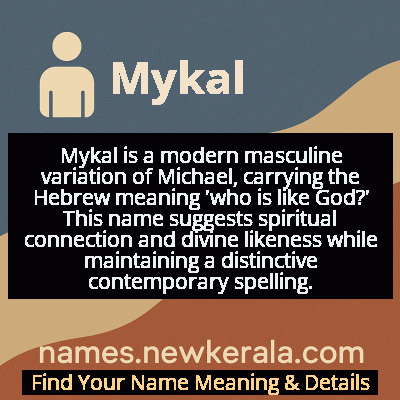Mykal Name Meaning & Details
Origin, Popularity, Numerology Analysis & Name Meaning of Mykal
Discover the origin, meaning, and cultural significance of the name MYKAL. Delve into its historical roots and explore the lasting impact it has had on communities and traditions.
Name
Mykal
Gender
Male
Origin
Hebrew
Lucky Number
8
Meaning of the Name - Mykal
Mykal is a modern masculine variation of Michael, carrying the Hebrew meaning 'who is like God?' This name suggests spiritual connection and divine likeness while maintaining a distinctive contemporary spelling.
Mykal - Complete Numerology Analysis
Your Numerology Number
Based on Pythagorean Numerology System
Ruling Planet
Saturn
Positive Nature
Ambitious, efficient, realistic, and authoritative.
Negative Traits
Materialistic, stressed, confrontational, and can be overly ambitious.
Lucky Colours
Dark blue, black.
Lucky Days
Saturday.
Lucky Stones
Blue sapphire, amethyst.
Harmony Numbers
2, 4, 6.
Best Suited Professions
Business leaders, managers, financial services, law enforcement.
What People Like About You
Leadership, determination, organizational skills.
Famous People Named Mykal
Mykal-Michelle Harris
Actress
Young actress known for roles in 'Raven's Home' and voice work in animated series
Mykal Walker
Professional Football Player
NFL linebacker for the Atlanta Falcons known for his defensive skills
Mykal Kilgore
Singer and Actor
Broadway performer and vocalist known for powerful performances in musical theater
Name Variations & International Equivalents
Click on blue names to explore their detailed meanings. Gray names with will be available soon.
Cultural & Historical Significance
The cultural journey of Mykal mirrors broader societal shifts in naming conventions, where traditional names are adapted to reflect modern sensibilities while preserving their historical and religious roots. In many ways, the name embodies the American ideal of individuality within tradition - maintaining connection to ancestral meanings while asserting personal identity. The spelling variation also reflects how names evolve as they cross cultural boundaries, adapting to new linguistic environments while carrying forward their essential character and significance.
Extended Personality Analysis
Individuals named Mykal are often perceived as possessing strong leadership qualities combined with a protective nature, reflecting the name's archangel origins. They tend to be confident, determined, and principled, with a natural inclination toward defending others and standing up for what they believe is right. The unique spelling of the name often correlates with a desire for individuality and self-expression, suggesting someone who values authenticity and isn't afraid to stand out from the crowd. Many Mykals demonstrate a balance between traditional values and modern thinking, able to honor their roots while embracing contemporary ideas.
In social settings, Mykals are frequently described as loyal friends and reliable companions who take their responsibilities seriously. They often exhibit a thoughtful nature, combining the strength suggested by their name's meaning with emotional intelligence and empathy. The distinctive spelling may also indicate parents who valued creativity and uniqueness, potentially influencing the individual's self-perception as someone destined to make their own mark rather than follow conventional paths. This combination of traditional strength and modern individuality often results in people who are both grounded and innovative, capable of leading while understanding the importance of protecting and nurturing those in their care.
Modern Usage & Popularity
Mykal has maintained steady but modest usage since the 1970s, primarily in English-speaking countries with the United States showing the highest concentration. The name peaked in popularity during the 1980s and 1990s when unique spellings of traditional names became particularly fashionable. While never reaching the overwhelming popularity of the standard 'Michael' spelling, Mykal has carved out its own niche among parents seeking a familiar yet distinctive name. Current usage trends show it appearing most frequently in North America, with occasional use in the UK and Australia. The name continues to appeal to parents who want the strong biblical and historical associations of Michael but prefer a less common spelling that allows their child to stand out while maintaining connection to traditional values and spiritual heritage.
Symbolic & Spiritual Meanings
Symbolically, Mykal represents the bridge between divine protection and human individuality. The name carries the weight of archangel Michael's symbolism - protection, strength, and moral courage - while the unique spelling adds layers of personal identity and modern self-expression. It symbolizes someone who walks between worlds: grounded in tradition yet forward-thinking, spiritually connected yet practically oriented. The name often represents a guardian figure, someone who protects not through aggression but through wisdom and moral clarity. In metaphorical terms, Mykal suggests a person who questions conventional authority ('who is like God?') while maintaining deep spiritual or ethical convictions, embodying the balance between questioning and faith, individuality and community responsibility.

